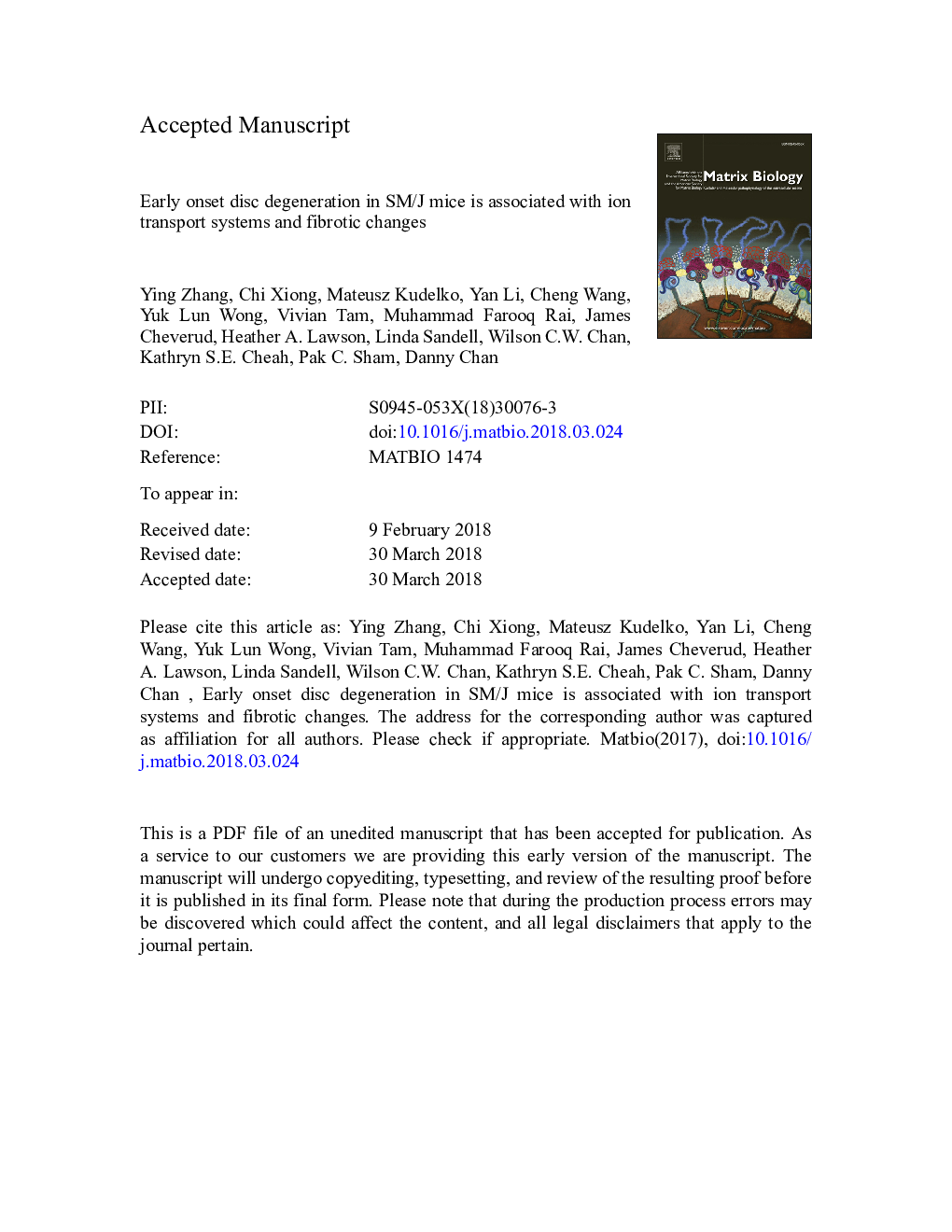| کد مقاله | کد نشریه | سال انتشار | مقاله انگلیسی | نسخه تمام متن |
|---|---|---|---|---|
| 8454965 | 1547993 | 2018 | 48 صفحه PDF | دانلود رایگان |
عنوان انگلیسی مقاله ISI
Early onset of disc degeneration in SM/J mice is associated with changes in ion transport systems and fibrotic events
دانلود مقاله + سفارش ترجمه
دانلود مقاله ISI انگلیسی
رایگان برای ایرانیان
کلمات کلیدی
IDDMatrisomeECMCEP - MOBILEOsteoarthritis - استئوآرتریت(آرتروز)Intervertebral disc degeneration - انحطاط دیسک بین واگراCartilaginous endplate - اندام ورقه ورقهion transport - حمل و نقل یونKEGG یا Kyoto Encyclopedia of Genes and Genomes - دایرة المعارف ژن ها و ژنوم کیوتو Kyoto Encyclopedia of Genes and Genomes - دایره المعارف ژنتیک ژن ها و ژنوم کیوتوIntervertebral disc - دیسک بین مهرهایIntervertebral discs - دیسک های بین مهره ایFibrosis - فیبروز یا فساد الیافExtracellular matrix - ماتریکس خارج سلولیNucleus pulposus - هسته پالپوسGene ontology - هستیشناسی ژنیGenetics - ژنتیک
موضوعات مرتبط
علوم زیستی و بیوفناوری
بیوشیمی، ژنتیک و زیست شناسی مولکولی
تحقیقات سرطان
پیش نمایش صفحه اول مقاله

چکیده انگلیسی
Intervertebral disc degeneration (IDD) causes back pain and sciatica, affecting quality of life and resulting in high economic/social burden. The etiology of IDD is not well understood. Along with aging and environmental factors, genetic factors also influence the onset, progression and severity of IDD. Genetic studies of risk factors for IDD using human cohorts are limited by small sample size and low statistical power. Animal models amenable to genetic and functional studies of IDD provide desirable alternatives. Despite differences in size and cellular content as compared to human intervertebral discs (IVDs), the mouse is a powerful model for genetics and assessment of cellular changes relevant to human biology. Here, we provide evidence for early onset disc degeneration in SM/J relative to LG/J mice with poor and good tissue healing capacity respectively. In the first few months of life, LG/J mice maintain a relatively constant pool of notochordal-like cells in the nucleus pulposus (NP) of the IVD. In contrast, chondrogenic events are observed in SM/J mice beginning as early as one-week-old, with progressive fibrotic changes. Further, the extracellular matrix changes in the NP are consistent with IVD degeneration. Leveraging on the genomic data of two parental and two recombinant inbred lines, we assessed the genetic contribution to the NP changes and identified processes linked to the regulation of ion transport systems. Significantly, “transport” system is also in the top three gene ontology (GO) terms from a comparative proteomic analysis of the mouse NP. These findings support the potential of the SM/J, LG/J and their recombinant inbred lines for future genetic and biological analysis in mice and validation of candidate genes and biological relevance in human cohort studies. The proteomic data has been deposited to the ProteomeXchange Consortium via the PRIDE [1] partner repository with the dataset identifier PXD008784.
ناشر
Database: Elsevier - ScienceDirect (ساینس دایرکت)
Journal: Matrix Biology - Volume 70, September 2018, Pages 123-139
Journal: Matrix Biology - Volume 70, September 2018, Pages 123-139
نویسندگان
Ying Zhang, Chi Xiong, Mateusz Kudelko, Yan Li, Cheng Wang, Yuk Lun Wong, Vivian Tam, Muhammad Farooq Rai, James Cheverud, Heather A. Lawson, Linda Sandell, Wilson C.W. Chan, Kathryn S.E. Cheah, Pak C. Sham, Danny Chan,